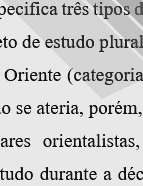
Vasconcelos Abreu and his orientalist peers, both national and international, were sympathetic towards positivist ideas, especially during the 1870s. They were interested not only in tracing the historical, ethnic and linguistic origins of the peoples of Europe, but also in understanding those of the ‘oriental’ populations over which European countries exercised sovereignty, a condition for the progress both of the colonies and, naturally, the European metropole, which would claim responsibility for leading this process of evolution for itself. As in Germanic countries, writers in Portugal, such as Teófilo, Antero and Oliveira Martins, would also invoke the thesis of a superior mythical origin – the Aryans – for the Portuguese people (Catroga, “A história começou a Oriente”, 1999, pp. 218-222).
In 1898 Consiglieri Pedroso put forward another definition of orientalism that was also geared towards the study of the past, particularly of classical antiquity: “Orientalism, which is to say the awesome revelation of the old, extinct civilizations whose fame formerly echoed throughout the Asian world, could only be called into being by the likes of William Jones, Colebrooke, Rawlinson and so many other learned men, after the boldness of our mariners had made accessible those lands where the remains of the empires they brought to life lay” (Influencia dos Descobrimentos, 1898, p. 24). In addition to connecting orientalism to the study of history, Pedroso also highlights the issue of the empirical precedence that would be maintained as an argumentative subtext and unifying link between the various national discourses about the East from the end of the nineteenth century and throughout the twentieth: Portugal’s pioneering role in gaining in loco knowledge of ‘oriental’ – particularly Asian – territories, as well as of their peoples and languages, through the country’s maritime expansion, made possible by the journey of Vasco da Gama (1497-1498). This journey would serve as the theme of the so-called “Portuguese Orient”, “which constructed itself over a period that runs from the first years of the sixteenth century until the first decades of the eighteenth century, a temporal cut-off marking the moment when one can consider that the process of establishing the Portuguese State in the Orient was stabilized” (Saldanha, “Do Oriente Português”, 2004, p. 28). Fin-de-siècle discourses concerning the Orient returned tirelessly to this idea of direct contact, which, on the one hand, recalled a period of progress in the history of the nation that had intermediated the first cultural and commercial exchanges between Europe and Asia. On the other hand, this topic served to highlight a turning point in the history of European progress and modernity, and, consequently, in the construction of both an orientalist discourse and imaginary.

